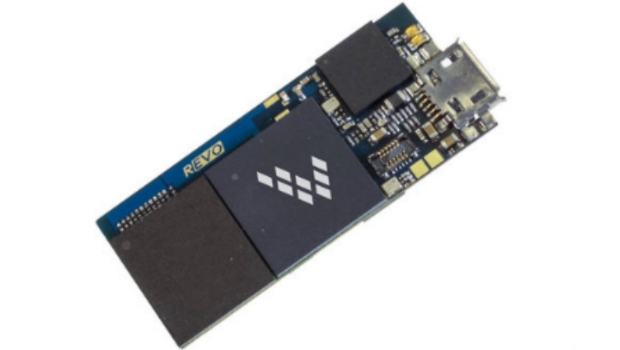Freescale Warp development kit
Freescale Semiconductor wants users to develop and test their own wearable devices with a mini-computer.
With the Warp development kit, users can make smart glasses, smart watches, pedometers, health monitors and other wearable devices, the company said Monday. The Warp includes a small uncased computer, which is slightly larger than a dime, through which wearable devices can be developed and tested before release.
The kit is targeted at makers and companies looking to prototype and develop products.
“Companies can use this platform as a basis for their own wearable product and invest their resources into innovation and differentiation instead,” said Robert Thompson, director of consumer business development for microcontrollers at Freescale.
The Warp (originally an acronym for ‘wearable reference platform’) is like a miniature version of the Raspberry Pi, an uncased Linux-based computer the size of a credit card. But with features like wireless charging, the Freescale computer is tuned for low-power wearable devices that have wireless connectivity and can be worn around the body. The Raspberry Pi is more for robots, PCs, smartphones and tablets.
“[Warp] provides the building blocks… that addresses the key challenges seen by wearable device manufacturers – connectivity, battery life, miniaturisation, and usability,” Thompson said.
Warp has the key wireless, memory and throughput components incorporated on the main board or expansion cards. But at $149, it could be deemed much more expensive than the Raspberry Pi, which is priced from $25 to $35.
“Raspberry Pi is a great board, but if a developer wants to develop a product based on its key components, they are either not available for purchase or available at greatly inflated prices compared to the $35 cost of Raspberry Pi,” Thompson said.
The wearable market is growing at a swift rate, and is viewed as an emerging business opportunity for device and chip makers. Gartner last month forecast revenue from wearable electronics, apps and services for fitness and personal health to reach $5 billion in 2016, increasing from $1.6 billion in 2013.
The development kit was announced ahead of this week’s International CES, where wearable devices are expected to dominate the floor. Products on display will include health monitors, smart glasses for augmented reality, clothes with sensors, and smartwatches that work with smartphones to provide messages, call notifications, news and weather information.
An important element in wearable devices is connectivity, and the Warp supports Bluetooth and 802.11 Wi-Fi. It does not support Zigbee, which is used by a wide number of sensor arrays to communicate. Warp also has LCD and E-ink display interfaces, USB, power management features and sensors such as accelerometers and magnetometers. The mini-computer is expandable through add-on cards – also called daughter cards – through which other wearable devices like health monitors can be made and tested.
“We currently have two other daughter cards in planning for launch in 2014 that will enable other usage models including ECG and continuous heart rate monitoring,” Thompson said.
By exploring new usage models, the Warp community will also help in the development of expansion cards, Thompson said.
The board has a Freescale single-core i.MX 6SoloLite processor based on the ARM Cortex-A9 processor core design. It has 2D graphics capabilities, and draws minimal power. The i.MX 6SoloLite chip supports external 32-bit LPDDR2 memory or low-voltage DDR3 memory. It also supports Ethernet inputs and SD cards.
Warp comes with Android 4.3 OS and a related software development kit. The hardware is open source, and the company will publish the schematics of the board for others to replicate and manufacture.
“We are following the Open Source Hardware Association best practices. We will also publish a complete open source version of Android 4.3 with limited functionality,” Thompson said.
Warp is a result of a collaboration between Freescale, software company Kynetics and robotics company Revolution Robotics, Freescale said.
Agam Shah, IDG News Service
@agamsh agam_shah@idg.com






Subscribers 0
Fans 0
Followers 0
Followers